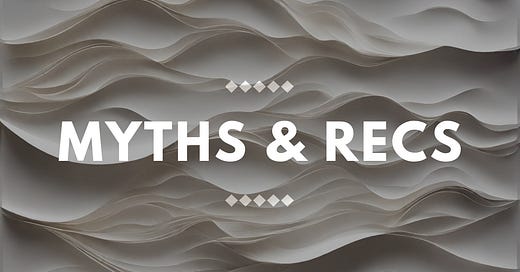Welcome to this month’s Myths & Recs, a short-form post where I share what I’ve been digesting, and nuggets of insight or information I think will be relevant to my readers. I usually aim to publish these on the fourth Saturday of the month, so it’s a week late, but hopefully still scintillating.
Let’s dive in.
First off, some mini myth-busting:
If Biden loses, it’s our fault: There’s a tendency to blame regular people for the consequences of what those in power choose to do. In response to the Uncommitted movement, we hear the refrain that if Biden loses it’s our vault for not voting. We hear Trump is worse, Biden is trying, you don’t get to recuse yourself then claim the moral high ground, etc.
But the truth is exactly in reverse. We should be saying, “Biden, if you lose, it’s your fault.” We should be saying, if your administration is sending your money and your weapons to fund a genocide, you are responsible for that genocide. It’s insidious to blame the left, especially protestors trying to practice creative resistance, instead of the right for rallying around Trump as the alternative to Biden, and instead of Biden and his administration for actively prolonging the slaughter.
It also keeps the focus on elections, especially national elections, as the be-all end-all of politics. We can have broader horizons and bolder visions. The most exciting thing for me about the Uncommitted movement, and the Blockout, and Stop Cop City, and the myriad methods of resistance, is how ordinary people are realizing we can exert pressure on the systems we live in, not only the other way around.
at speaks to this as well: the goal isn’t to make Biden lose, it’s to make him change — if not his mind, then his behavior. If the threat of losing reelection does the trick, well then it will certainly be our victory.Things I’m watching:
Kurzgesagt — one of my favorite YouTube channels, introduced to me by my partner. Kurzgesagt creates “[a]nimation videos explaining things with optimistic nihilism since 12,013. We’re a team of illustrators, animators, number crunchers and one dog who aim to spark curiosity about science and the world we live in. To us nothing is boring if you tell a good story.”
I love their aesthetics, the narrator's voice, and the succinct way they're able to present detailed scientific concepts. Some of my favorite videos have addressed how the dinosaurs died, how to change habits, and a glimpse into the far future.
We need more infrastructure to meet our energy needs: this is technically true, but belies an upside-down framing. Crucially, we need to figure out how to use less energy. That means we need to do fewer things more slowly with fewer resources. That’s why this newsletter focuses on the death of this world, not on more of the greenwashed same.
With the Inflation Reduction Act and the pause on LNG terminals, Biden has done more than any president (yes, it's a low bar) to position us for the transition to renewable energy. The problem is we’re still calculating energy needs based on current energy usage. No such model could ever be sustainable, even if it were completely renewable. Instead, we can think bigger by thinking smaller.
Things I'm reading:
What your favorite 90s Christian rock artist tells you about who you are today — linked to in Culture Study’s A Long Weekend of Links & Recs, this was a fascinating throwback to my days in the evangelical church. I’d be curious to know if any of my readers recognize these names or if it’s just me!
The Return of Mind-Blowing Facts — another thread from
, this one is full of marvelous miscellany. Some highlights: brussel sprouts really did use to taste worse; some cats are allergic to humans; the loudest animal in the world is the tiger pistol shrimp, whose claws clack so loudly they create light, a phenomenon called sonoluminescence.
We need economies of exchange in order to have modern society: That may be true, if by modern society we mean credit scores, insurance plans, and tax brackets. But if by modern society we mean indoor plumbing, public transport, and universal healthcare, not in the least. We can have economies of gift instead.
It turns out that many of what we were taught were “primitive” barter economies, rudimentary versions of our more evolved systems, were actually gift economies. These operated by generosity and goodwill, with systems in place to preclude the accumulation of wealth through hoarding. People in these societies consciously rejected the values we take for granted. There's no reason we can't make a conscious shift in values as well.
Things I’m listening to:
Dublin to Dakar by Putumayo — a compilation of various artists and styles from several countries, this album represents the music I grew up with. I’ve been on a nostalgic kick recently, coming back to the media that informed my childhood, and it’s deeply refreshing.
Thank you for reading Anarchy Unfolds. This publication is entirely supported by my readers. Each free subscription helps grow the networks we need to weather the storms as a new world emerges. If you value this work, consider becoming a paid subscriber. I’m always grateful for your time and attention.






On the Biden part, did you feel the same way for liberals that didn't vote for Hilary and voted Green party or simply didn't vote? Was the Trump administration and subsequent supreme court shift their fault or Hilary's? I'm just curious if you're maintaining the same line of thinking through time or shifted?
Personally, I don't blame the voters but Hilary and the Democrat party for selecting her in the first place. If Biden loses I also will not blame the Democrat voters but Biden and the Democrat party again.
I didn’t know about Kurzgesagt, thanks! I loved all of the same videos you did, especially the Dinos one.